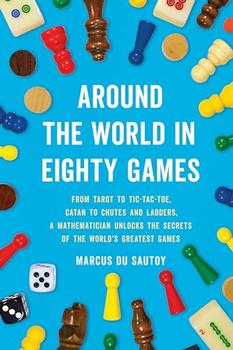Summary | Excerpt | Reviews | Beyond the Book | Readalikes | Genres & Themes | Author Bio

From Tarot to Tic-Tac-Toe, Catan to Chutes and Ladders, a Mathematician Unlocks the Secrets of the World's Greatest Games
by Marcus du SautoyOPENING MOVES
SIX TO START. Knight to f3. Two no trumps. Black stone on komoku. Take a chance card. Climb the ladder to square 38. These are the opening lines of some of the most wonderful stories that humanity has created. Since ancient times, civilizations have been playing games—some with dice, some with cards, others with pieces that move about on a board or tabletop.
Some have argued that our species should be called homo ludens rather than homo sapiens because it is the ability to play, not think, that has been crucial in our development. Evolution seems to have gifted humanity a penchant for trying out strategies and exploring imaginary worlds in the safety of a game, which allows us to prepare ourselves for real encounters. Among some of the earliest civilizations, sophisticated games emerged alongside the burgeoning of societies. Play is free. It is not real. It has its own location and duration. It is distinct from our ordinary lives. And yet it impacts on the way we behave outside the game: our wars, politics, arts, and sciences.
Like the stories shared around the campfire to bond our kinfolk, the games we have created allow us to share an exciting journey together in safety. Games resemble stories by conjuring up a fictional world, transporting the players into a different temporal dimension whose artificial barriers we enjoy striving to overcome.
Yet games are also stories that we can play out with our friends. As shared experiences, they have some advantages over the solitary disappearance into a book. They are more active, giving the players agency in the way the story evolves. A novel can move you to tears, but a game can make you feel guilty for your actions.
This book tells the story of the many crazy, fantastic, addictive games that our species has created during our time on this planet. To be sure, just as we do, other animals play games as children: lion cubs play fight before putting those skills to use as adult hunters. But our species is probably unique in continuing to play games into adulthood.
Not everyone grows up to become an adult game player. Some see the whole enterprise of battling to overcome self-imposed rules to reach an artificial destination as a complete waste of time. Playing a game is certainly an indulgence afforded to those with surplus time on their hands. But when we achieve the kind of utopia that absolves us of the need to work because the machines are doing it all for us, my belief is that games will become the central focus of our time thereafter.
I love games. I love them so much so that on all my travels around the world, I seek out the games that people like to play in the country I'm visiting. By the time I head home, my bag invariably has a few new local games packed inside. Just as the stories that people tell can help me understand a different society, I have found too that the local games people play can reveal much about the differences and similarities across different cultures. Some cultures favor games of chance over contests of strategy, perhaps reflecting their preference for a fatalistic outlook on life over a belief in agency over one's destiny. A fondness for a territorial game like Go over a more directly aggressive game like chess seems to reveal something about what a culture values and how it views the world. But while some games reveal the differences between cultures, other games seem so universal that versions are played around the world.
Games and their history help me to understand how each different culture has emerged. They are a living archaeology capturing the passions and pursuits of the people of the past. Tell me the game you play,
and I'll tell you who you are.
And when I am stuck at home unable to travel, the games I've collected provide a way for me to escape back into the world they came from. The games are portals to the many countries I've visited. They are passports to other worlds—whether historical, geographical, or mathematical. Being cocooned by my collection at home is a constant and welcome reminder of the distances that we can all travel with our minds.
Excerpted from Around the World in Eighty Games: From Tarot to Tic-Tac-Toe, Catan to Chutes and Ladders, a Mathematician Unlocks the Secrets of the World's Greatest Games by Marcus du Sautoy. Copyright © 2023. Available from Basic Books, an imprint of Hachette Book Group, Inc.
Your guide toexceptional books
BookBrowse seeks out and recommends the best in contemporary fiction and nonfiction—books that not only engage and entertain but also deepen our understanding of ourselves and the world around us.